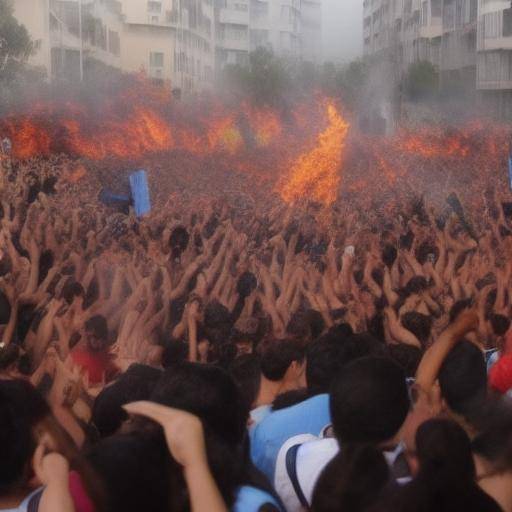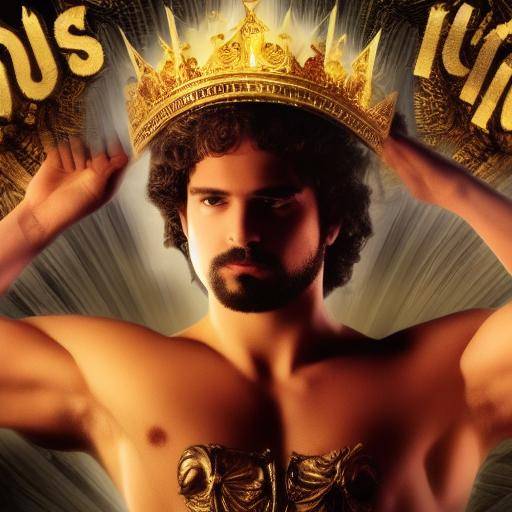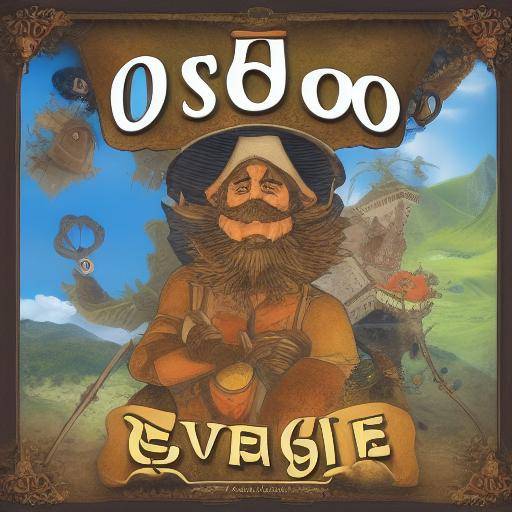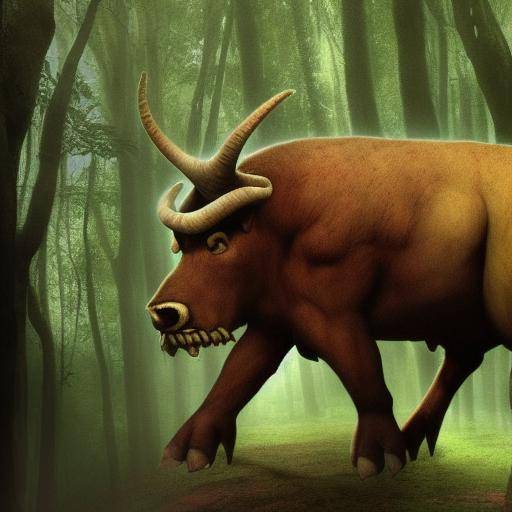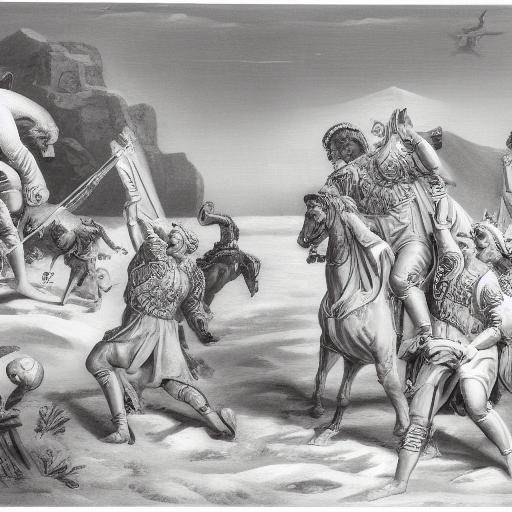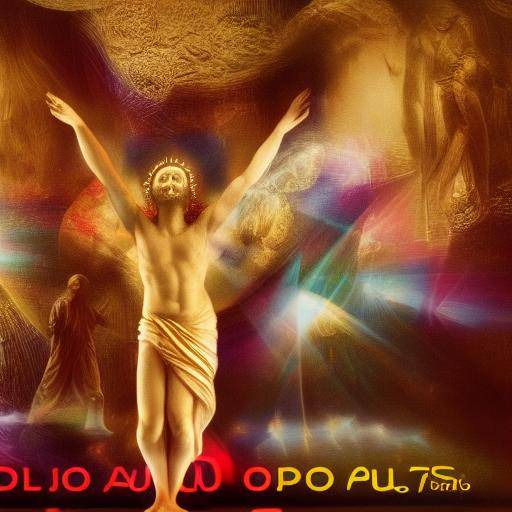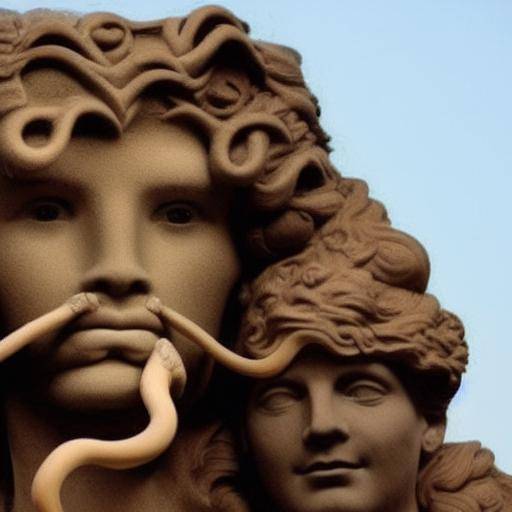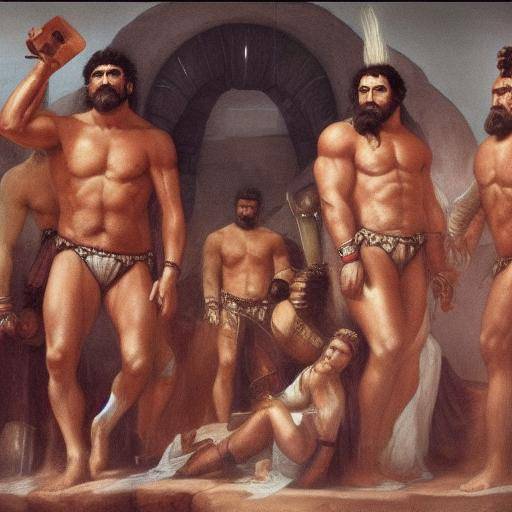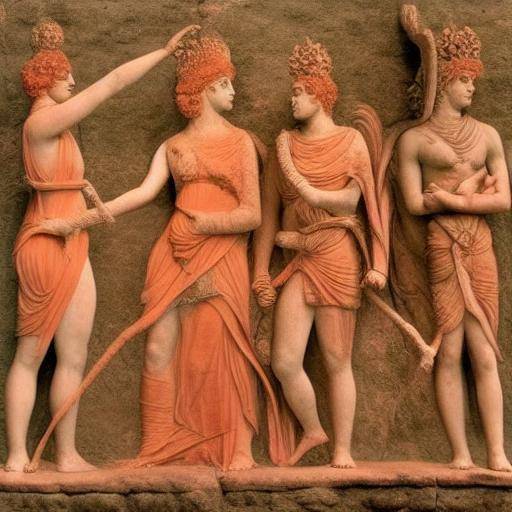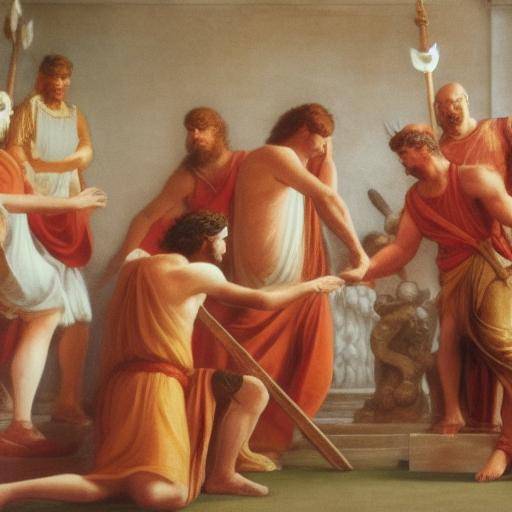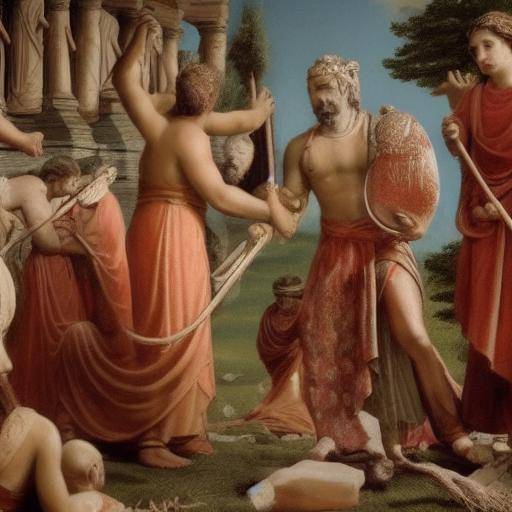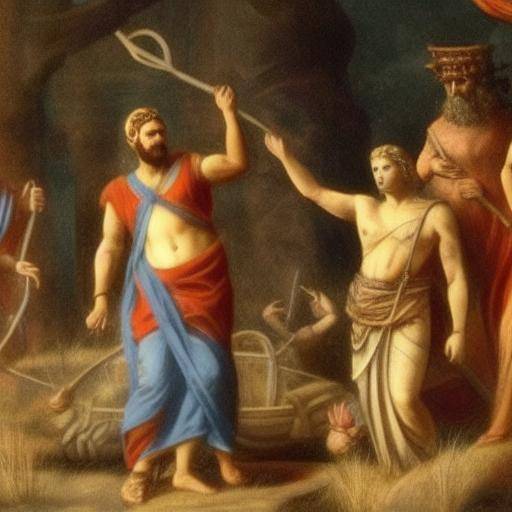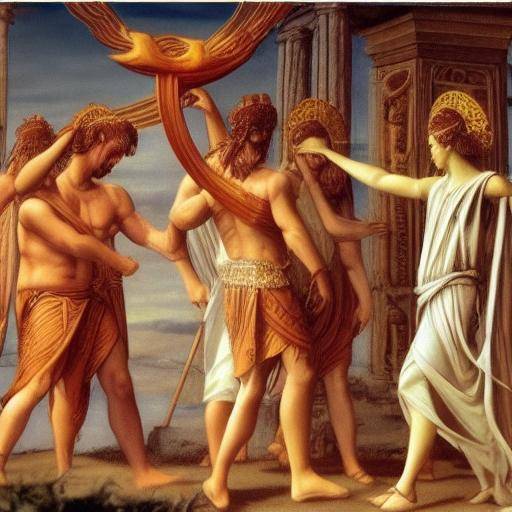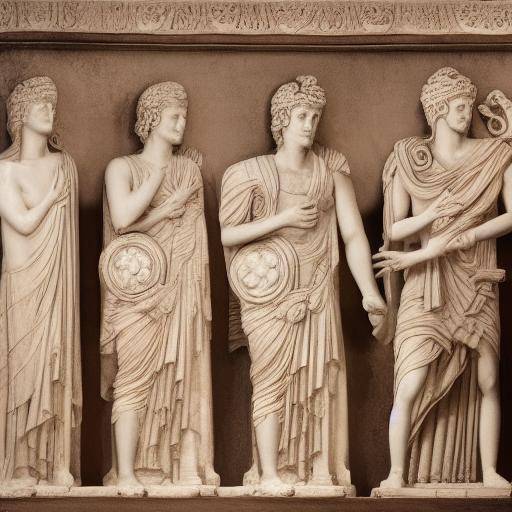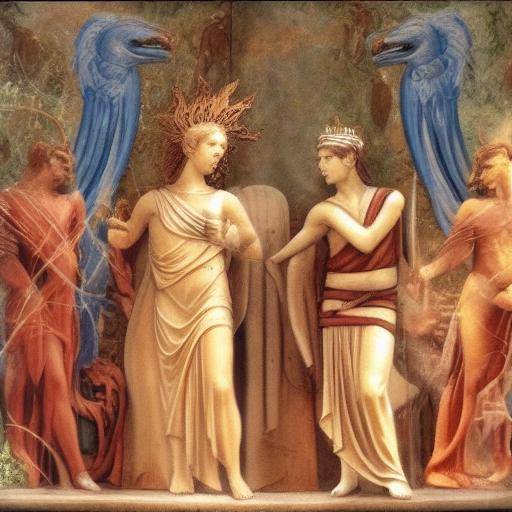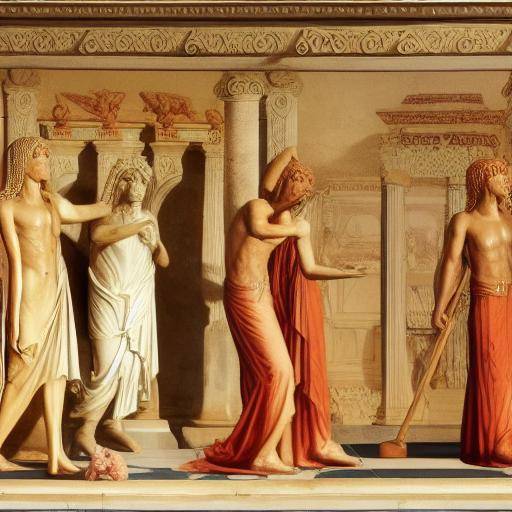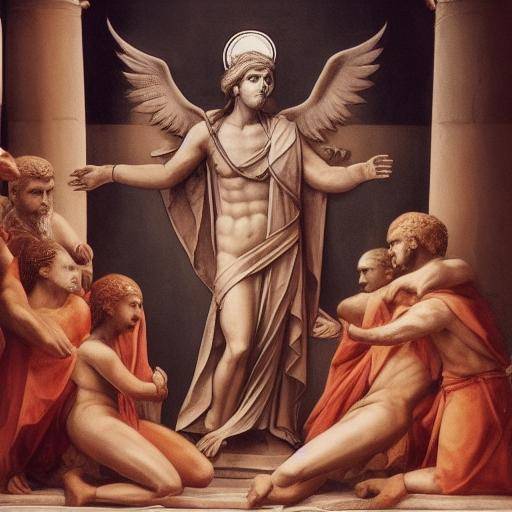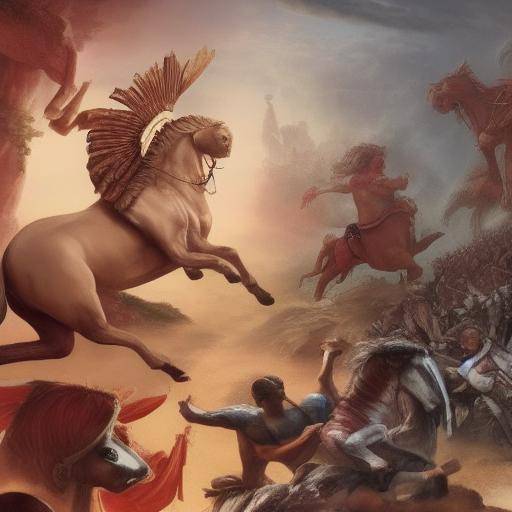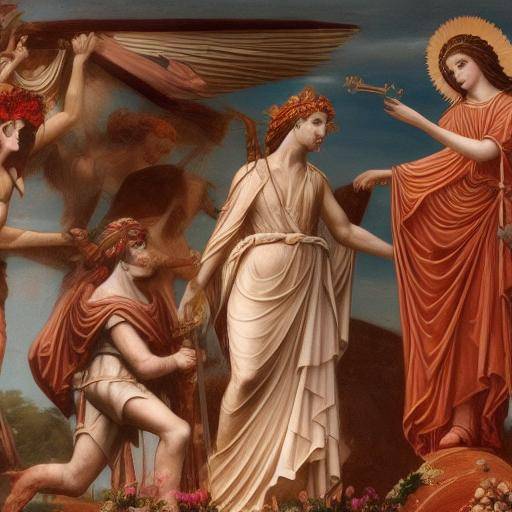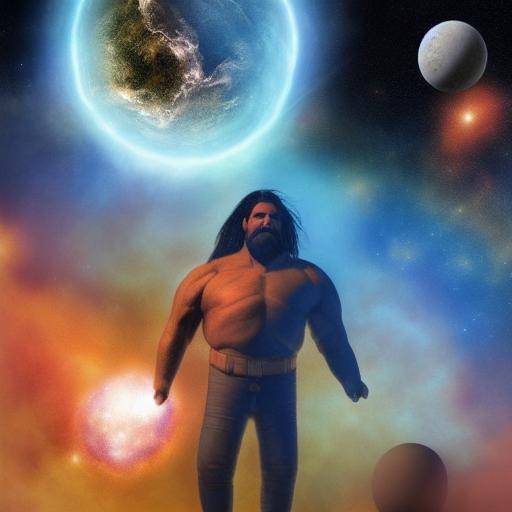
The titans, characters of Greek mythology, represent imposing and rebellious figures, whose relevance spans the centuries. In this article, we will explore in detail the history, meaning and importance of titans, as well as their relationship with giants and their impact on Greek mythology. Join us on this fascinating journey through the cosmos of the Titans and discover its lasting legacy in culture, art and history.
Introduction
In the vast Greek mythology, titans emerge as divine beings of immense power. Its origin, feats and confrontation with the Olympics have transcended generations, inspiring epopeyas, literary works and epic stories. Through this exploration, we will discover the essence of the titans, their role in Greek mythology and their connection with the giants, whose presence challenges the traditional conception of grandeur.
History and Background
The Titans, in Greek mythology, represent a primordial generation of immense divine beings, born of Gea, Earth, and Uranus, Heaven. With names such as Crono, Rea, Ocean, Temis, Hyperion, Coeo, Mnemósine, Febe, Teia, Rea, Tetis, Prometheus and more, each personifying celestial and terrestrial aspects, the Titans triggered a titanic struggle, challenging the dominion of their Uranian father and giving rise to an epic and transcendental battle.
This legendary contest, known as the Titanoquia, culminated in the victory of the Olympics over the Titans, establishing a new order in the cosmos. However, the imprint of the titans lasted, influencing the evolution of the world and its constant transformation. Through myths and legends, the Titans evoke the struggle for power, change and resistance, as well as the polarity between light and darkness, creation and destruction.
In exploring the legacy of titans, it is essential to address the relationship with giants, colossal beings born also of the Earth, but with a different nature. The giants, in contrast to the Titans, embody the brute force, rebellion and direct confrontation with the Olympics, representing the antithesis of divine harmony. This dichotomy between titans and giants adds complexity to the mythological fabric, enriching narratives and shedding light on the diversity of forces that shape the universe.
Titans, throughout history, have transcended their mythological origin, permeating culture, art and literature. Its influence expands from antiquity to contemporaneity, capturing the imagination and creative spirit of artists, writers, philosophers and thinkers. This pervival of the titans in human consciousness attests to their lasting importance as symbols of struggle, rebellion and greatness, present in the worldview of societies and their cultural expressions.
Myths and Legends of Titans
In the various mythological narratives, the titans feature epic stories that transcend time and space. From the Titanomaquia to the Titanesomachia, their confrontations with the Olympics reveal the complexity of their personalities and their influence on the destiny of the world. These myths provide a window to the understanding of the values, virtues and conflicts that resonate in the human heart, providing meaning and transcendence.
Iconography and Artistic Representation
The legacy of the titans is perpetuated through artistic representation, which has shaped its figure in sculptures, paintings, engravings and other media. The iconography of the Titans reflects its colossal stature, its majestic and its role in the cosmos, transmitting its greatness and its struggle against the divine designs. These representations, enriched by symbolisms and metaphors, exalt the magnificence of titans and their impact on visual culture.
Deep analysis
As we enter into a more detailed analysis of titans, we must consider its impact on Greek mythology and its significance in the collective imagination. From their ancestral origin to their symbolic dimension, the titans personify primordial forces that permeated the conception of the universe in ancient Greece. Through contemporary interpretations, the richness of meanings and influences emanating from these divine colossus is revealed.
Titans, as mythological figures, not only incarnate rebellion and the challenge to divine authority, but also represent cosmic duality, unifying opposites in a dynamic of continuous transformation. This duality manifests itself in the struggle for the power and coexistence of antagonistic forces, projecting the complexity inherent in the cosmic and human order.
Historical and Cultural Impact
The legacy of the Titans has been interwoven with history and culture, influencing various disciplines and currents of thought. From philosophy to literature, through theology and art, titans have exercised a lasting imprint that transcends the limits of mythology. His presence in visual arts, musicology, iconography and literature bears witness to the vitality of his legacy and his ability to reshape human experience.
Mythological complexities
The myths about titans contain multiple layers of meaning, showing the complexity of divine archetypes and their interactions with the human world. The narrative wealth surrounding the titans reveals the inextricable relationship between the divine and the human, offering teachings on balance and harmony, as well as on conflict and discord. These mythological complexities echo in the cultural ethos, providing a symbolic substrate that enriches the understanding of the human being and transcends the temporal limits.
Comprehensive review
In conducting a thorough examination of titans, it is essential to explore their practical applications and best approaches to understand their legacy and relevance in contemporary times. From a practical perspective, the Titans not only acted as mythical figures, but also offer a wealth of lessons, inspirations and perspectives that can nourish the cultural and spiritual acquis.
Contemporary Relevance
The relevance of titans in today's society subsists through their presence in art, literature, cinema and other means of expression. His lasting figure transcends temporary barriers, casting his shadow on human creativity and stimulating the exploration of fundamental issues such as power, freedom and destiny. This continuity in the relevance of the titans bears witness to its validity as universal archetypes, capable of resonating with the concerns and aspirations of the human being at different times.
Comparative Analysis of Myths and Realities
The comparative analysis of the myths of titans with contemporary realities reveals interesting parallels and divergences that illustrate the perennity of the ideas embodied by titans. This confluence between myths and realities offers a holistic vision that enriches the understanding of sociocultural phenomena, providing a lens through which to contemplate human nature and its ancestral pulsions.
Conclusions and FAQs (FAQs)
The legacy of the Titans, their rebelliousness and greatness, continue to resonate in the human imaginary, transcending time and space to inspire new generations. His presence in Greek mythology and its influence on contemporary culture emphasizes the lasting relevance of his legacy.
Frequently asked questions (FAQs)
1. What is the importance of titans in Greek mythology?
The titans occupy a central place in Greek mythology, representing primordial forces that defy established order and personify cosmic duality. Their confrontation with the Olympics and their lasting legacy distinguish them as fundamental figures in the Greek divine pantheon.
2. What is the relationship between titans and giants in Greek mythology?
Titans and giants, although they share a primordial origin linked to the Earth, represent different aspects in Greek cosmogony. While the titans symbolize cosmic and divine forces, the giants personify the brute force and rebellion against the established order.
3. How have Titans influenced contemporary culture?
The legacy of the Titans has influenced numerous cultural expressions, from art and literature to cinema and music. His rebellion, grandeur and struggle for power have served as sources of inspiration for contemporary artists, writers and creators, maintaining their relevance over time.
4. What lessons can be drawn from the myths and legends of titans?
The myths of the Titans offer profound lessons on the struggle for power, resistance against adversity and the dual nature of the cosmos. Through these narratives, fundamental themes that transcend the epochs are explored, providing a wider understanding of the human condition and its relation to the divine.
5. What is the impact of titans on literature and art throughout history?
The titans have left an indelible mark on literature and art, serving as symbols of greatness, rebellion and transformation. From ancient times to present, his presence has inspired countless literary works, artistic representations and philosophical reflections, enriching the cultural heritage of humanity.
6. Why does the interest in titans persist in contemporary popular culture?
The continued interest of titans in contemporary popular culture is due to their ability to incarnate universal archetypes that resonate with human concerns and aspirations. Their rebellion, grandeur and struggle for power connect with fundamental aspects of human experience, keeping their relevance alive over time.
Conclusions
In short, the Titans emerge as imposing and rebellious figures whose legacy persists in Greek mythology and collective imagination. Its influence transcends the mythological sphere, permeating culture, art, literature and philosophical reflection, providing a lens through which to contemplate fundamental aspects of the human condition and its relation to the cosmos. The study and understanding of the titans and their interaction with the giants enrich our vision of the universe and its mysteries, inviting us to explore the complexities of power, rebellion and greatness, and to reflect on its lasting significance in contemporary culture.
Throughout this journey, we have unraveled the mysteries of the Titans, exploring their meaning, legacy and impact on Greek mythology and contemporary culture. From their confrontation with the Olympics to their presence in iconography and literature, the Titans not only embody first-hand forces, but also embody universal archetypes that resonate with human concerns and aspirations throughout the ages.
Ultimately, the legacy of the Titans, in all their greatness and rebellion, transcends the world of myths to give us teachings about struggle, resistance and permanence in the human imaginary and their influence on cultural expressions. The titans remain as symbols of struggle, greatness and rebellion, offering a transcendental perspective on archetypes that model human experience and their relationship with the divine. Thus, in contemplating the legacy of the Titans, we enter into a cosmos of myths and symbols that feed the imagination, awakens curiosity and invites us to reflect on the eternal struggle between order and chaos, between destiny and freedom.
In short, the Titans represent a fundamental pillar of Greek mythology and continue to captivate humanity with its rebellion, strength and resistance. His legacy endures over the centuries, transcending the limits of ancient culture to inspire and enrich human creativity. The titans challenge us to explore the depths of the cosmos and to reflect on our own inner struggle, providing an imperishable legacy that continues to fascinate and astonish through the eras.
With this, we concluded our journey through the cosmos of the Titans, giants and rebels of the Greek mythology. His legacy endures as a beacon of knowledge, inspiration and greatness, reminding us that, although the gods may fade in time, the lessons and archetypes that have read us continue to give meaning to our existence in the vast universe.
Throughout this journey, we have unraveled the mysteries of the Titans, exploring their meaning, legacy and impact on Greek mythology and contemporary culture. From their confrontation with the Olympics to their presence in iconography and literature, the Titans not only embody first-hand forces, but also embody universal archetypes that resonate with human concerns and aspirations throughout the ages.
With this, we concluded our journey through the cosmos of the Titans, giants and rebels of the Greek mythology. His legacy endures as a beacon of knowledge, inspiration and greatness, reminding us that, although the gods may fade in time, the lessons and archetypes that have read us continue to give meaning to our existence in the vast universe.
With this enriching exploration, we trust to have provided an exhaustive and revealing vision of the titans, giants and rebels of the cosmos, and to have aroused greater interest in the rich legacy of Greek mythology. As our understanding expands, we immerse ourselves in a universe of meanings and symbols, where the greatness and rebellion of the Titans continue to resonate and challenge the borders of our imagination.

